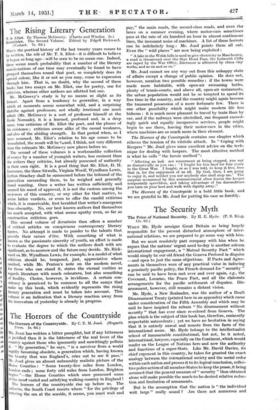The Rising Literary Generation
WHEN the poetical history of the last twenty years comes td be written, the role of Mr. T. S. Eliot—it is difficult to believe it began so long ago—will be seen to be no mean one. Indeed, there seems much probability that a number of the literary manifestations of our time may eventually be found to have grouped themselves round that poet, so completely does its special colour, like it or not as you may, come to expression through him. That is, no doubt, why the second of these books has two essays on Mr. Eliot, one for poetry, one for criticism, whereas other authors are allotted but one.
Mr. McGreevy's study is by no means so slight as its format. Apart from a tendency to generalize, in a way which at moments seems somewhat wild, and a surprising diatribe against professors, not wholly irrational one must admit (Mr. McGreevy is a sort of professor himself at the Ecole Normale), it is a learned, profound and, in a deep sense, true criticism of Mr. Eliot .the poet, and the phases of his existence ; criticism aware alike of the casual weakness, and also of the abiding strength. In that period when, as I have assumed, Mr. Eliot's relation to his age comes to be formulated, the result will be eland, I think, not very different from the estimate Mr. McGreevy now places before us.
The second of these volumes is a workmanlike collection of essays by a number of youngish writers, less eminent than the writers they criticize, but already possessed of authority in their own right. It is a good thing that Mr. Eliot, D. H. Lawrence, the three Sitwells, Virginia Woolf, Wyndham Lewis, Lytton Strachey shall be summoned before the tribunal of the generation succeeding them, to be weighed and generally found wanting. Once a writer has written sufficiently and secured his meed of approval, it is not the custom among the reviewers of this country, or any other for that matter, to revise latter verdicts, or even to offer the candid criticism which, it is conceivable, first heralded that writer's emergence from obscurity. No, our best known authors find themselves too much accepted, with what seems apathy even, so far as constructive criticism goes.
This second volume of Scrutinies then offers a number of critical articles on conspicuous contemporary literary figures. No attempt is made to pander to the talents that provide their raison d'itre. With something of what is known as the passionate sincerity of youth, an effort is made to evaluate the degree to which the authors dealt with are significant, as to-morrow and the future may decide. Mr. Rick- ward on Mr. Wyndham Lewis, for example, is a model of what criticism should be, tempered, just, appreciative where merited, while Mr. Penton's note on the modern novel, for those who can stand it, states the eternal verities as regards literature with much coloratura, but also something of finality. Choice, however, is invidious. A certain con- sistency is perceived to be common to all the essays that make up this book, which evidently represents the rising literary generation and must be taken into account. This volume is an indication that a literary reaction away from the innovators of yesterday is already in progress.























































 Previous page
Previous page